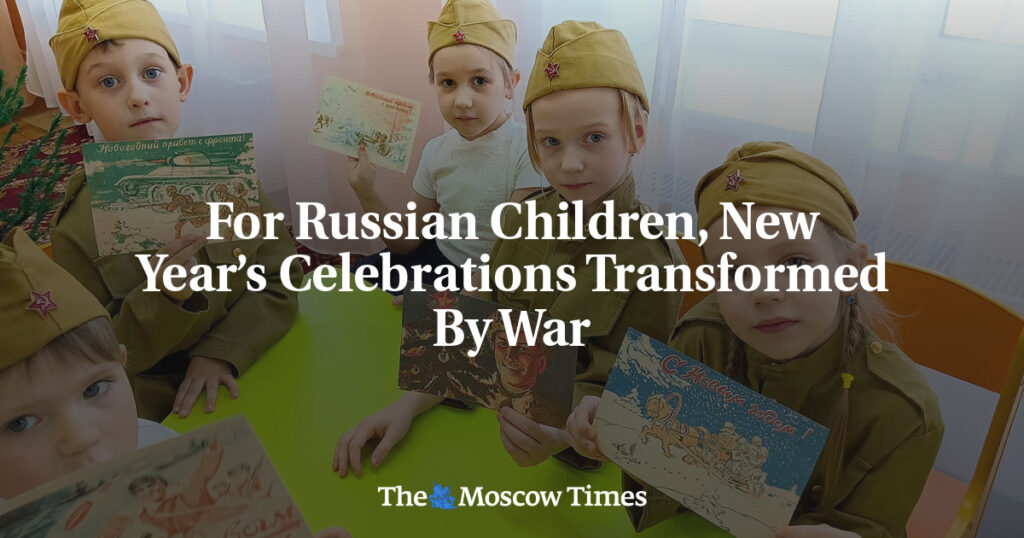The New Year has been the most important family holiday in Russia since the Soviet era, when authorities promoted it as a secular alternative to Christmas.
Three years into the Kremlin’s invasion of Ukraine, Russian teachers and caregivers described to The Moscow Times how this once-apolitical holiday has become yet another tool for the state to indoctrinate children with its wartime ideology.
This December, soldiers fighting in Ukraine are visiting children for New Year’s celebrations; Ded Moroz, a Santa Claus-like figure, brings staples like bread and sugar instead of gifts; and children in orphanages are recording messages for soldiers at the front.
“Partisans instead of Ded Moroz and bread instead of candy will disappoint children. Children’s psyches are fragile; they need consistency, and any ‘surprises’ only make kids anxious,” said Yekaterina Yashina, a preschool teacher and child psychologist.
Efforts to promote support for the war in Ukraine and the Russian military reached kindergartens and schools soon after the invasion in February 2022.
Children across the country were photographed forming pro-war “Z” symbols, while Conversations About Important Things — mandatory propaganda lessons about Russian history — were added to the school curriculum.
In December 2022, Russian authorities launched Frontline Postcard, a campaign in which children as young as three write New Year’s letters to Russian soldiers. In these messages, schoolchildren typically wish soldiers victory in the war against Ukraine and good health.
Letters from children especially “warm the hearts of frontline soldiers in battle,” President Vladimir Putin said in his 2023 address to the Federal Assembly.
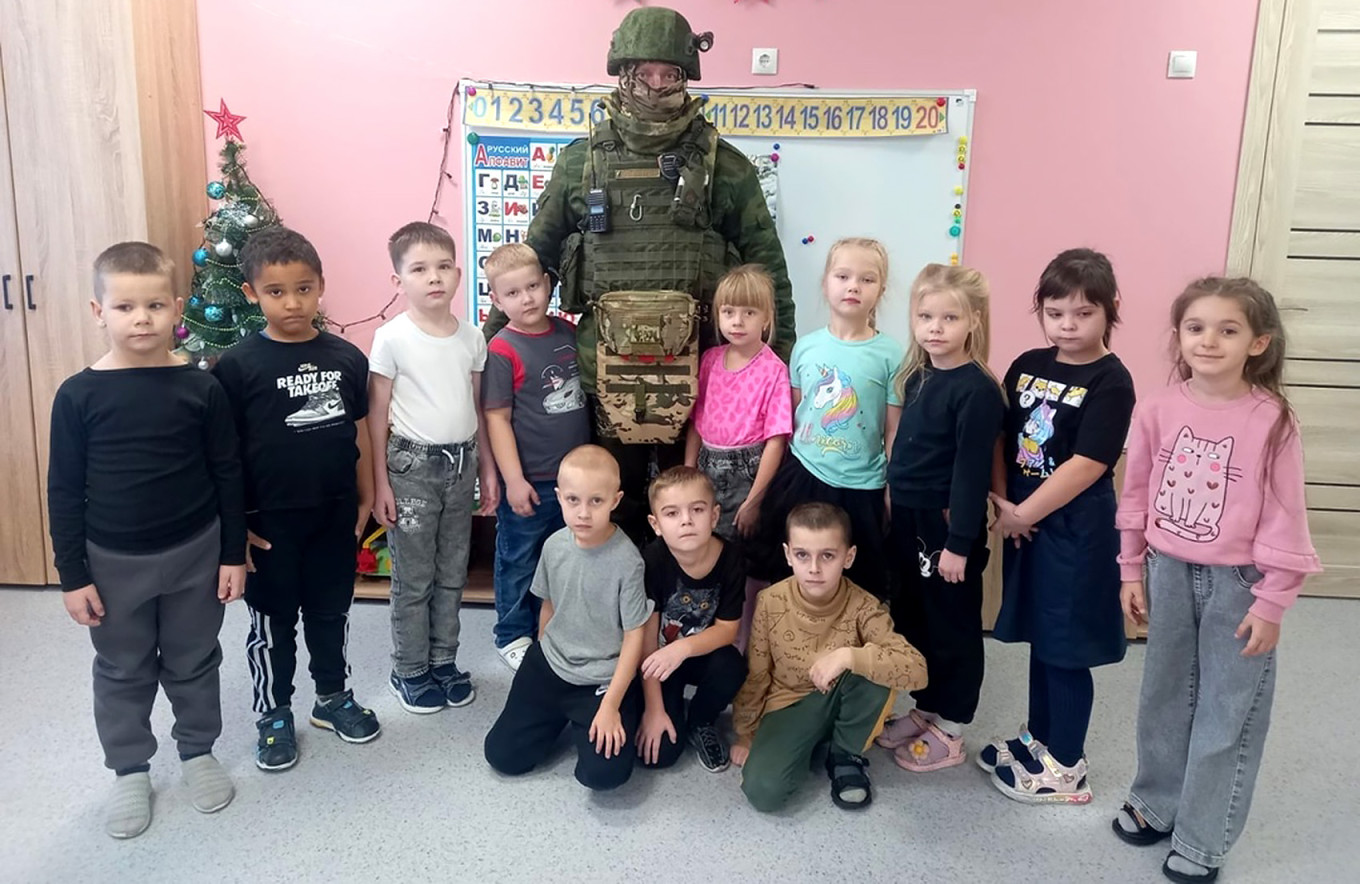
Despite this, New Year’s celebrations had largely remained free from overt political messaging until recently, according to Yashina. But as Russian authorities began throttling YouTube speeds this year, educators found it increasingly difficult to keep the holiday isolated from wartime propaganda.
“I used to play New Year’s songs on YouTube for my preschoolers while they drew Christmas trees. The last time I tried, everything [on the computer] froze,” Yashina said. “I said, ‘Oh well, YouTube isn’t working.’ And they replied, ‘Of course, because the Americans turned it off for us’.”
Schools and preschools hold New Year’s celebrations for children starting from around the age of three. Children traditionally receive sweets and toys from Ded Moroz (Father Frost) and his granddaughter Snegurochka.
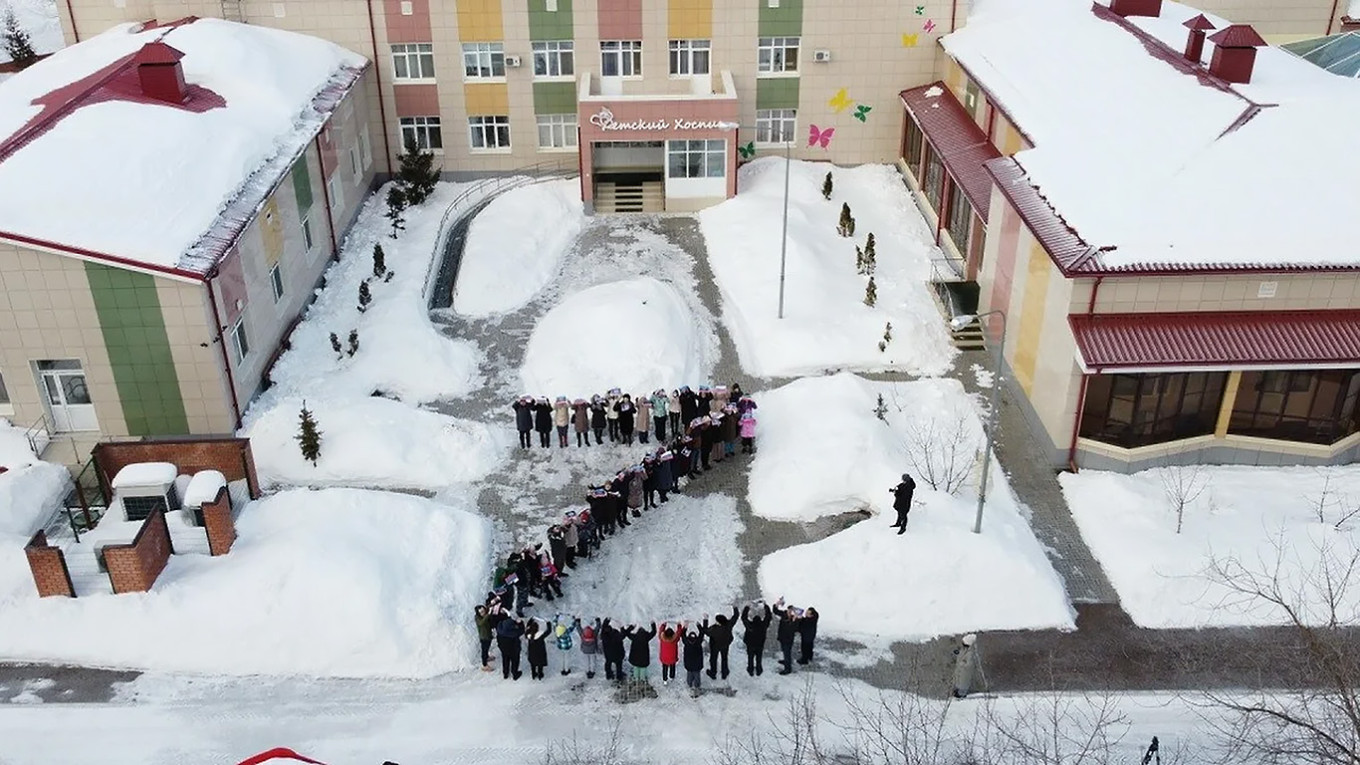
tatar-inform.ru
At one such event in the Kemerovo region this December, Ded Moroz arrived dressed as a partisan to deliver greetings on behalf of Russian soldiers.
Instead of sweets, he handed out bread and sugar, saying: “These were the favorite treats of children during the war years.”
In preparation for the partisan-themed New Year celebration, children from the Berezka kindergarten were dressed in military uniforms — girls as field nurses and boys as soldiers. Caregivers wore uniforms modeled after those worn by Soviet soldiers during World War II.
Preschoolers from Kindergarten No. 94 in Nizhny Novgorod received a football as a New Year’s gift from a Russian soldier fighting in Ukraine who wore a balaclava covering half of his face. Accompanying him was a representative from a foundation supporting military personnel and their families.
“The meeting was truly warm and homely. The children shared their hobbies, talked about how they prepared New Year’s gifts for soldiers, and made drawings and postcards,” the kindergarten administration wrote on social media.
As a memento, kindergarten staff received a military patch with Slavic women in a traditional kokoshnik headdress as well as a certificate of appreciation for their “assistance in collecting humanitarian aid for soldiers.”
On the same day, at the Stalin Center in Barnaul, actors dressed as Ded Moroz and Snegurochka attended a children’s holiday party along with “Barmaley the Liberal,” a pirate-like character. Children were encouraged to shout, “Do we really need a liberal? Liberal, go away!” before posing for photos in front of a New Year’s tree adorned with a portrait of Josef Stalin.
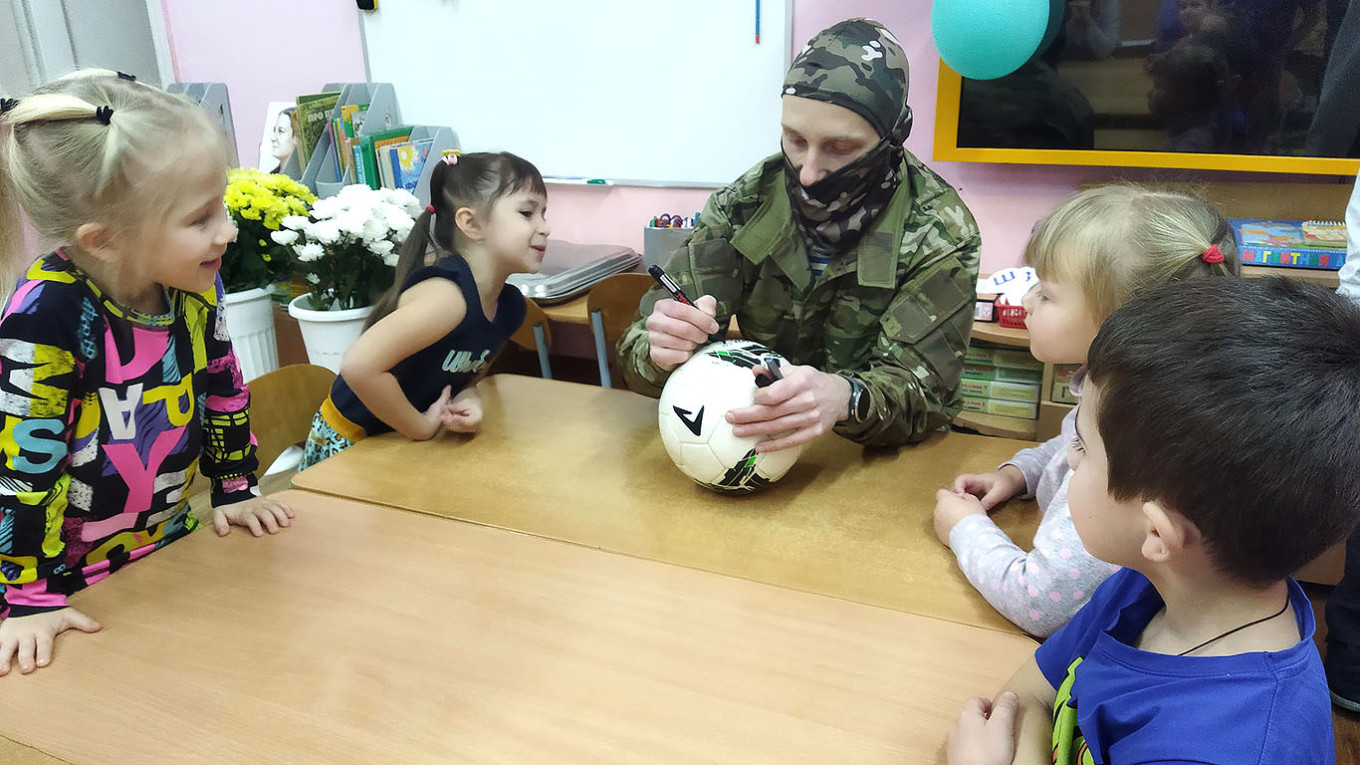
Kindergarten No. 94 / VK
Reactions from parents and local residents ranged from outrage and shame to nostalgia for the Soviet Union.
“A Stalin Center, especially in Siberia, is just pure cringe,” one resident wrote on Telegram.
“I’d go to such a New Year’s party and indulge in a bit of nostalgia… They’ve overdone it a little with these ‘liberals’… It’s just like those [Soviet] times. Bravo! Had a laugh and moved on,” said local pensioner Yelena Kruglova.
Siberia was home to some of the largest gulag camps under Stalin, including Norillag, Sevvostlag, and Dallag. Hundreds of thousands of prisoners passed through these labor camps.
Elizaveta Limanskaya, a journalist for the independent Sibir.Media news outlet, described the event in Barnaul as a “private gathering for 20 people with very specific tastes.”
The militarization of New Year’s celebrations normalizes war in children’s eyes, said child psychologist Yashina.
“While playing pretend war, the sense of horror toward real war diminishes. Children trust their caregivers because they replace the maternal figure from around the age of three. From the position of ‘You are under my protection,’ it is easy for adults to create imaginary threats for children,” Yashina said.
This year, even teenagers in military uniforms are visiting children ahead of New Year’s celebrations.
On Dec. 19, a member of the Patriot youth group from St. Petersburg gave a talk on patriotism to a group of five-year-olds. The teenager was dressed in a military uniform bearing a Wagner mercenary group patch that read “Nothing personal, we were paid to do it.”
The boy showed the kindergarteners his uniform, military rations and canned food supplies. He also organized tug-of-war and jumping competitions for the preschoolers.
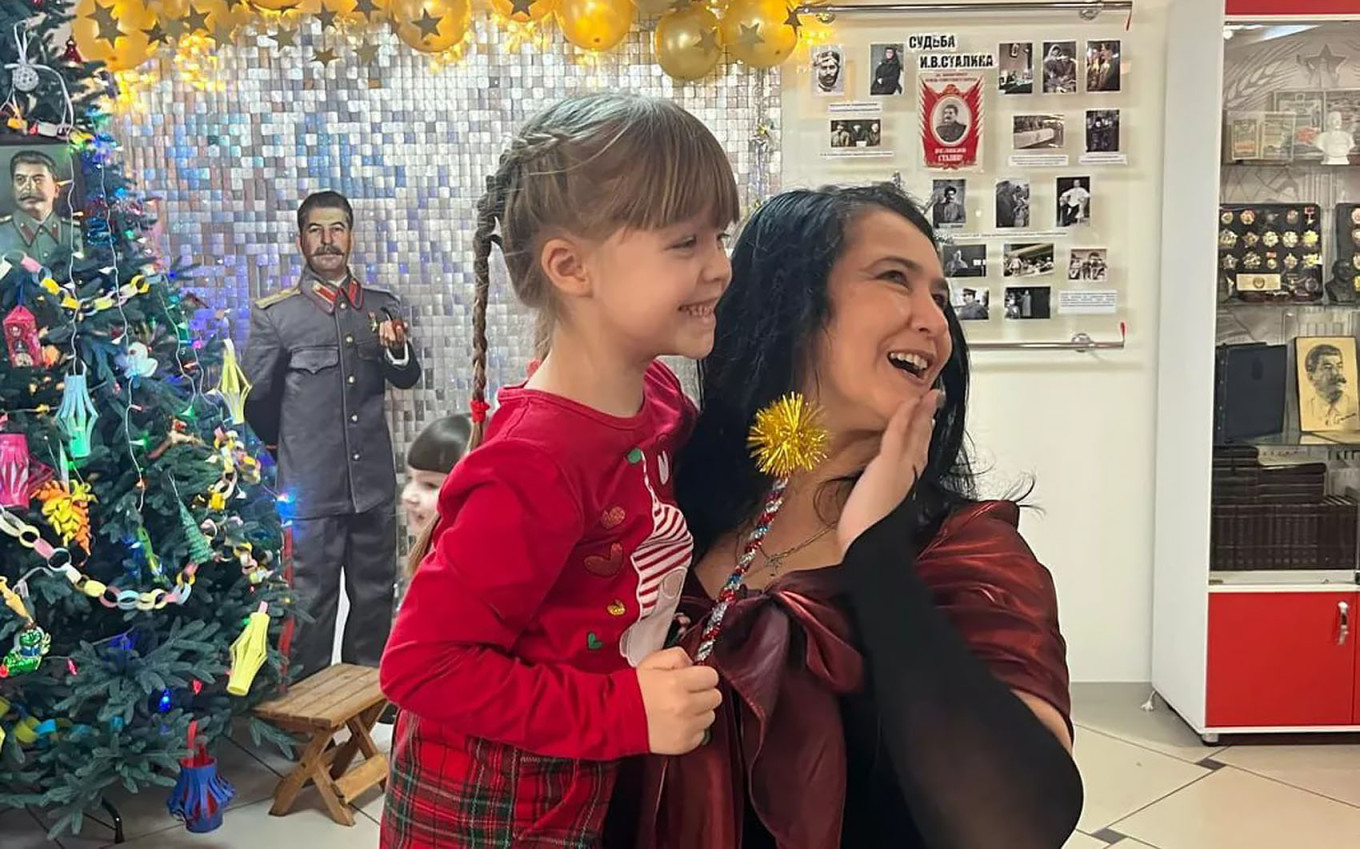
The peak of militarism at children’s events typically occurs on Victory Day and Defender of the Fatherland Day, a kindergarten director in St. Petersburg told The Moscow Times.
“Pro-government activists approached us, asking the children to create greetings for soldiers for May 9 and February 23. We complied, but without overdoing it. We simply congratulated the soldiers,” the director said, speaking on condition of anonymity for safety reasons.
Planting a sense of external danger and the need for defense is easier in orphanages, Yashina said, as caregivers assume the role of the child’s parents.
On Dec. 19, ahead of the New Year celebrations, caretakers involved at a children’s home in the Samara region had orphans create protective charms adorned with the Russian tricolor, postcards and letters for soldiers.
“Stay invincible,” one of the orphanage children wrote in a letter to the front.
Orphans were also filmed for New Year’s video greetings to Russian military personnel. In response, soldiers dressed in military uniforms and holding weapons also recorded messages for children.
Many of these militaristic events for orphans are organized by Children of the Whole Country, an organization of orphanage graduates. Its head, Albert Sarbalaev, is a staunch supporter of Putin’s policies.
Child psychologist Yashina predicts that the government’s push on patriotic education for children will only intensify in the coming year.
On Dec. 22, Putin declared 2025 the Year of the Defender of the Fatherland, dedicated to “participants of the special military operation and in memory of the heroism of all ancestors.”
“The atmosphere among the youth should align with the spirit of the times,” Yashina said. “After all, the whole world is burning right now.”
A Message from The Moscow Times:
Dear readers,
We are facing unprecedented challenges. Russia’s Prosecutor General’s Office has designated The Moscow Times as an “undesirable” organization, criminalizing our work and putting our staff at risk of prosecution. This follows our earlier unjust labeling as a “foreign agent.”
These actions are direct attempts to silence independent journalism in Russia. The authorities claim our work “discredits the decisions of the Russian leadership.” We see things differently: we strive to provide accurate, unbiased reporting on Russia.
We, the journalists of The Moscow Times, refuse to be silenced. But to continue our work, we need your help.
Your support, no matter how small, makes a world of difference. If you can, please support us monthly starting from just $2. It’s quick to set up, and every contribution makes a significant impact.
By supporting The Moscow Times, you’re defending open, independent journalism in the face of repression. Thank you for standing with us.
Continue
Not ready to support today?
Remind me later.
×
Remind me next month
Thank you! Your reminder is set.


